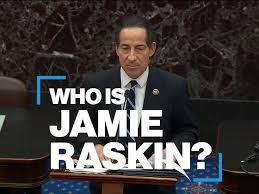FnF News
“Screeching at the People?” Raskin’s Heated Outburst Raises Eyebrows—and Octaves
By Khadija Khan | FNF News | June 13, 2025
WASHINGTON, D.C. — Representative Jamie Raskin is facing a fresh wave of scrutiny—not for a new policy position or legislative fight—but for the tone, pitch, and volume of his voice during a fiery recent exchange with a constituent.
What began as a routine Q&A spiraled quickly into an unexpected vocal spectacle that many are now calling emblematic of the Democratic congressman’s unraveling patience with the public. Eyewitnesses report Raskin’s voice jumped “at least two octaves” within the first 30 seconds of being challenged on surveillance policy and Gaza protest responses.
“He went from calm professor to screeching prosecutor like someone had hit a wrong piano key,” said activist Jules Navarro, who recorded the moment.
In the now-viral clip, Raskin can be heard raising his voice dramatically before launching into a string of character attacks against the person who posed the question—calling them “uninformed,” “manipulated,” and “an agent of chaos.” The question? Why he voted against a bipartisan civil liberties amendment.
“Is This the Same Guy?”
The episode has triggered widespread reaction on social media, where users are expressing dismay at the lawmaker’s sudden volatility. For many, the sharp contrast between Raskin’s well-earned reputation as a calm, articulate legal scholar and his now-famous flare-up is jarring.
“I thought he was one of the grown-ups in the room,” said user @CivicJane on X (formerly Twitter). “Now I’m wondering if he’s just another elitist who can’t handle real questions.”
Critics are especially focused on the rapid transition from legal discussion to personal insult—a rhetorical move that some say is becoming all too common among elected officials.
“Calling people names instead of answering tough questions isn’t just petty—it’s dangerous,” said First Amendment advocate Kareem Singh. “We’re supposed to be able to challenge power without being shouted down.”
From Top Lawyer to Triggered Lawmaker?
Jamie Raskin has long been celebrated for his work as a constitutional scholar and his steady performance during the January 6 hearings. He’s been viewed as an intellectual anchor for Democrats, often chosen for media appearances and House arguments because of his sharp, lawyerly mind.
But some now worry that Raskin’s recent public behavior reflects either burnout—or an evolving belief that those who question him don’t deserve an answer.
“When you abandon argument in favor of volume, it’s not a good look—especially for a constitutional lawyer,” said legal analyst Rebecca Torres.
The outburst also reinforces a narrative gaining traction among critics of Washington elites: that many lawmakers only value free speech when it flatters them, and bristle when constituents ask real, uncomfortable questions.
Echoes of Elitism
The vocal moment may have gone viral for its pitch, but the underlying critique runs deeper. Raskin, some say, has become emblematic of a broader trend among high-ranking Democrats who now appear more interested in dismissing dissent than engaging with it.
“This wasn’t just about screeching,” said political commentator Darren Cole. “It was about a powerful official who couldn’t handle being challenged. He didn’t debate—he belittled.”
That attitude, critics argue, is fueling growing distrust in Congress. A recent Gallup poll shows that only 18% of Americans believe Congress listens to ordinary citizens, down from 34% just five years ago.
Supporters Push Back—But Are Quiet on the Outburst
Raskin’s defenders say he was provoked, and that the questioner was part of a coordinated disruption. But notably, few have directly defended his tone or insults.
“Jamie Raskin has done more for democracy than most,” said progressive strategist Lila Grant. “But yeah, that clip was not his best moment.”
For others, the concern isn’t the clip—it’s the context. Raskin is not the only lawmaker lately who’s shouted down the public, avoided accountability, or reacted poorly when confronted.
“This is a pattern now,” said protestor Alex Mendoza. “First they ignore us. Then they shout at us. Then they say we’re extremists. When did asking a question become a threat?”
Conclusion: When the Volume Rises, the Trust Falls
In the halls of power, words matter. So do tone and temperament. And in a moment where the country is more polarized, frustrated, and skeptical than ever, Raskin’s screech heard ‘round the Hill may have done more damage than he realizes—not just to his image, but to the already frayed trust between Americans and those elected to serve them.
One sign at a protest outside his D.C. office may have said it best:
“If your best defense is yelling louder—maybe you don’t have one.”

